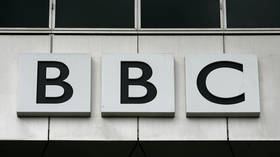
The broadcaster insists that despite being financed by a mandatory fee, it’s not state-funded

FILE PHOTO: The British Broadcasting Corporation sign on its offices at White City in London, Britain, October 17, 2007 © AP / Kirsty Wigglesworth
Twitter CEO Elon Musk has ignited a feud with the BBC by labeling the British broadcaster a “government funded media” organization. The BBC denies taking state money and its defenders claim that being funded by the British government differs from being funded by the British public.
Twitter applied the label to the BBC’s main account earlier this week, after slapping US broadcaster NPR with a similar tag describing it as “US state-affiliated media.” While Twitter previously reserved such labels for foreign media outlets – like RT and China’s CGTN, Musk said that applying it to NPR “seems accurate.”
NPR’s tag was changed to read “government-funded media” after an outcry from US liberals.
The BBC bristled at receiving the tag. “We are speaking to Twitter to resolve this issue as soon as possible,” the broadcaster said in a statement on Sunday. “The BBC is, and always has been, independent. We are funded by the British public through the licence fee.”
READ MORE: US broadcaster gets ‘state’ tag on Twitter
On Twitter, the BBC’s defenders pointed to the license fee as proof of the network’s independence. The BBC, Deadline reporter Jake Kanter argued, “is funded by the British public through a system known as the licence fee. The BBC’s operations and editorial decision-making are entirely independent of the government.”
However, commenters pointed out that the license fee “is a government tax in all but name.”
The BBC's apologists love referring to the license fee as a cover against criticism. The fact of the matter is, if you don't pay the license fee, agents start turning up at your door. It is a government tax in all but name. pic.twitter.com/bt9VSHfDGm
— Ben Kew 🏌️♂️ (@ben_kew) April 9, 2023
Set by the government, the fee is an annual payment of £159 ($197) owed by any household with a television or device capable of receiving television broadcasts. The BBC hires contractors to visit the homes of suspected evaders, and those who refuse to pay can be prosecuted by the broadcaster. Around 45,000 people per year are prosecuted for failing to pay the license, the Telegraph reported last month.
The UK’s Office for National Statistics classifies the fee as a tax, and the BBC as part of the “central government sector” of the UK economy.
In addition to determining the cost of a TV license, the government directly funds the BBC World Service and finances the BBC’s ‘Media Action’ department. This department, which is also funded by the governments of the US, Canada, Norway, Sweden, the EU, the UN, and the Bill and Melinda Gates Foundation, supplies two dozen developing countries with “information they can trust,” per the BBC’s website.
While the BBC stated that it is editorially independent, internal communications published by the Guardian last month showed that its editors asked reporters to avoid using the term “lockdown” when talking about the government’s response to the Coviid-19 pandemic, under direct order from the government. Furthermore, journalists were instructed to be more critical of the opposition Labour Party due to complaints from the government.




